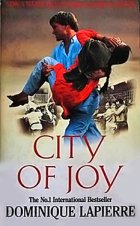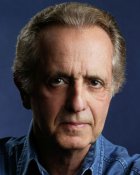
City of Joy Page #7
- PG-13
- Year:
- 1992
- 132 min
- 795 Views
JOAN:
Oh, now we require that eachvisitor decide that for himself.
This gentleman and a young ladybrought you here.
MAX:
Did I do that to your nose?
(as Hasari nods)
I'm sorry.
(CONTINUED)
32.
CONTINUED:
Hasari shrugs, smiles... and a gigantic rat drops inMax's lap. He leaps to his feet and against the wall.
The rat scurries away.
MAX:
What was that -- a Shetland pony?
JOAN:
I would have to inspect it moreclosely, but I believe that wasone of our economy-size rats.
Max clambers for the door. Too late, Joan thinks to
say...
JOAN:
Watch your -
Max cracks his head on the door frame.
MAX:
Thanks -- got it.
He ducks outside for some air.
EXT. CLINIC/SCHOOL - NIZAMUDHIN LANE - MAX'S FACE
Stunned.
SQUARE:
In the dawn light, he finds himself in a small square ina slum, an open sewer running before him. He's repulsed.
MAX:
Pardon the expression, but Jesus
H. Christ.
From the tea shop, SURYA, a stout old Hindu man dressedin Western clothes, raises a hand in greeting to Joan.
On the door Max and Joan have come through: "City of JoySelf Help School & Clinic." Across the way, a young manis dandling a baby on his knee, rubbing its back andsniffing at its neck. Small group of children around ablackboard with a teacher, MARGARETA, doing numbers.
RAM CHANDAR, the rickshaw puller, readies to go out towork. Trying to orient himself, Max turns...
ANOTHER ANGLE:
... to find perhaps fifty people, largely women andchildren, staring at him.
(CONTINUED)
33.
CONTINUED:
He knows them by type: patients. He looks at the signon the door.
MAX:
You a doctor?
JOAN:
Oh no, I'm a corporate executive.
Doctor arrives at half seven, but
only three days a week.
MAX:
This is obviously one of thosethree days.
JOAN:
Indeed. What brings you to ourcountry?
MAX:
I came to find my white light.
JOAN:
Ah, yes. I take it you didn'tfind it.
MAX:
Kept opening the doors and windowsof my spirit, but couldn't see agoddamn thing.
JOAN:
What do you do in America?
Max is slow to answer. Discreetly, Hasari hangs back,
listens.
JOAN:
Oh, how exciting. Must be
something illegal. Are you acriminal of some sort?
MAX:
I suppose that depends how youdefine the word: I'm a doctor.
JOAN:
I see. How long are you here?
Perhaps I could recruit you for -
MAX:
Forget it. You've got your non-
practicing Catholics. I'm a non-
practicing doctor.
(CONTINUED)
34.
CONTINUED:
JOAN:
How very distressing. Why's that?
MAX:
Found out I just really don't likesick people. Well, I'm outta
here. I owe you one.
JOAN:
I can't imagine ever divining howto collect, but there are a few of
us Indians, you know, who believethe tourist trade ought to beencouraged.
Max turns to Hasari. Hasari is incredibly shy, canbarely meet Max's eyes.
MAX:
Thank you very much. Let me...
He goes for his money.
HASARI:
No, please.
Max finds his pockets empty. Then reaches for his wrist
-- his watch is gone -- and then his throat -- his chaiis gone, too.
JOAN:
I'm afraid they cleaned you out.
Ram, here's your first rider.
(to Max)
Take this.
She holds out several rupees toward him. All eyes onthem.
JOAN:
Go on, it's all right. You'll owe
me two.
EXT. STREET - FLYING FEET - DAY
Max in the rickshaw, Hasari running alongside Ram, anexuberant smile slashed across his face.
HASARI:
You see, I can keep up.
(CONTINUED)
35.
CONTINUED:
RAM:
Keep up, of course. Anyone canrun at this pace. But you thinkit's easy to run and to pull?
HASARI:
I can do it. I could pull it.
MAX:
Come on, give him a shot. He's as
fast as you and looks twice as
strong.
RAM:
Will you still pay me when he runsyou into a ditch?
MAX:
Absolutely. I trust the man.
Suddenly, Ram comes to a stop.
RAM:
All right, you, come, step in here.
Hasari looks on Max with enormous gratitude. Ram putsthe shafts down, has a short coughing fit, spits somephlegm, looks at Max.
MAX:
I hope you're taking something forthat.
Ram waves him off as Hasari lifts the shafts to his hips.
RAM:
Now, fine, pull, go.
Hasari tries to pull, but the center of gravity isn'teasy to find. This is enormously difficult and Hasari'svery clumsy at it. The street is crowded. The traffic
is beginning to back up behind them. The driver and
conductor of the tram let fly a tirade of insults.
RAM:
See, mister! What did I tell
you? Come on! What do you thinkthis is -- some village street?
You've got to move quickly.
He turns to Max.
RAM:
You see, it takes a gift.
(CONTINUED)
36.
CONTINUED:
MAX:
I say he can do it. I'll bet you
the fare he can do it.
(play by play)
What do you think, rickshaw fans,
can he do it?
The crowd isn't in for fun. Hasari strains forward.
The rickshaw moves with him. Ram moves alongside,
shouting instructions and oaths. A cop comes on the run,
screaming at Hasai... which makes Ram importune more
strongly and Max joke more vociferously.
Even under this incredible pressue, Hasari gains
confidence and begins to move quicker, earning shouts
of approval from Max and Ram, who now has trouble
keeping up as they make their way through the maelstrom,
an avalanche of oaths following them.
INT. GODFATHER'S HOUSE - DAY
At first all we see are feet on a marble floor. The
Goonda's in his running shoes, then Ram and Hasari's
bare feet.
This is the partitioned splendor of an old house
sprinkled with the relics of a grand colonial past.
Everything is baroque, rotting and somehow impressive.
Hasari has never been anywhere like this, and is caught
between curiosity and fear of breathing.
INT. "THRONE ROOM"
The three men enter a large room shuttered from the sunlight
-- dusty and packed with a ramshackle assortment
of furniture. Two fat blue titmice perch in a cage next
to ambitious plaster portrait of Napolean.
Sitting behind a desk is Ashoka, leaning over a mirror,
squeezing a balky pimple.
Near a large window, his 60-year-old father, GHATAK, in
a European jacket and dhoti, works with intense concentration
at repairing a pair of broken glasses with a
twist of fine wire.
The three new arrivals stand silent and respectful
before the desk. At last, without raising his head...
ASHOKA:
Not a tongue between you then?
(CONTINUED)
37.
CONTINUED:
RAM:
Yes, yes, I am wondering, sir,
we are, is it possible you mighthave something for my friend?
Ram indicates Hasari, as if there might be some questionto whom he's referring. Ashoka attacks the pimple.
RAM:
Let me explain it for your ears,
sir. My cousin from Bihar hasjust arrived in our city -
GOONDA:
They've brought a small present-- of respect.
The Goonda places a small bundle of rupees on the desk.
Ashoka allows himself a disinterested glance atHasari.
ASHOKA:
So, you want to be a human horse?
RAM:
Oh yes! I have personally witnessedhis excellence -- yes.
ASHOKA:
He doesn't talk? Can he neigh atleast?
(to Hasari)
You -- do your ears function?
HASARI:
Oh yes, Babu. Can I... uhm...?
Translation
Translate and read this script in other languages:
Select another language:
- - Select -
- 简体中文 (Chinese - Simplified)
- 繁體中文 (Chinese - Traditional)
- Español (Spanish)
- Esperanto (Esperanto)
- 日本語 (Japanese)
- Português (Portuguese)
- Deutsch (German)
- العربية (Arabic)
- Français (French)
- Русский (Russian)
- ಕನ್ನಡ (Kannada)
- 한국어 (Korean)
- עברית (Hebrew)
- Gaeilge (Irish)
- Українська (Ukrainian)
- اردو (Urdu)
- Magyar (Hungarian)
- मानक हिन्दी (Hindi)
- Indonesia (Indonesian)
- Italiano (Italian)
- தமிழ் (Tamil)
- Türkçe (Turkish)
- తెలుగు (Telugu)
- ภาษาไทย (Thai)
- Tiếng Việt (Vietnamese)
- Čeština (Czech)
- Polski (Polish)
- Bahasa Indonesia (Indonesian)
- Românește (Romanian)
- Nederlands (Dutch)
- Ελληνικά (Greek)
- Latinum (Latin)
- Svenska (Swedish)
- Dansk (Danish)
- Suomi (Finnish)
- فارسی (Persian)
- ייִדיש (Yiddish)
- հայերեն (Armenian)
- Norsk (Norwegian)
- English (English)
Citation
Use the citation below to add this screenplay to your bibliography:
Style:MLAChicagoAPA
"City of Joy" Scripts.com. STANDS4 LLC, 2025. Web. 5 Feb. 2025. <https://www.scripts.com/script/city_of_joy_358>.







Discuss this script with the community:
Report Comment
We're doing our best to make sure our content is useful, accurate and safe.
If by any chance you spot an inappropriate comment while navigating through our website please use this form to let us know, and we'll take care of it shortly.
Attachment
You need to be logged in to favorite.
Log In